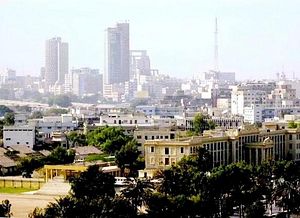Last Wednesday morning, Pakistani Army Rangers raided the headquarters of the Muttahida Qaumi Movement (MQM) in Karachi, the city’s dominant political party, on charges that illegal weapons were being held on the premises. Several party officials were arrested in the raid, which left one worker dead.
Though the Rangers have released several of the officials captured on Wednesday, the tension between MQM and Prime Minister Nawaz Sharif’s Pakistan Muslim League (PML-N) isn’t likely to let up any time soon. Earlier this month, party leaders complained that law enforcement had unfairly targeted them, instead of militant enclaves in Sindh province. They’ve also been hit with strikes from the Pakistani Taliban in recent years.
Those attacks have ignited the party’s rank-and-file members. Rallies in support of Altaf Hussain, MQM’s leader, exiled to London on conspiracy charges, drew thousands of demonstrators to the streets of Karachi in February. Hussain remains a key presence in the city’s politics, addressing supporters through a loudspeaker linked to his telephone.
But tension between MQM and Islamabad dates back much further than that. In his first term as prime minister, in 1992, Sharif ordered Operation Clean-up, designed to loosen MQM’s iron grip on Karachi after the group threatened to secede from Pakistan. But the group metastasized under Pervez Musharraf, and after Asif Ali Zardari assumed control in 2008, according to Zulfikar Ali Mirza, the then-home secretary, Pakistan held off on raiding ‘Nine Zero.’
What accounts for MQM’s hold on Karachi? Pakistan’s most populous city has descended into violence, with 2,715 reported murders in 2013. MQM has been condemned as a mafia and a terrorist group, accused of targeted killings and corruption. But MQM still commands a loyal following from Mohajirs, Muslims of Northern Indian descendent that fled to Pakistan during partition.
Since the Taliban attacked a Peshawar school in December, leaving 150 students dead, the Rangers have cracked down on groups like MQM at will. But even under fire, MQM remains a paralyzing force in Karachi – it can shut down transportation, stage strikes, and cause disruptions and damage that cost the economy billions of dollars in Pakistan’s business capital. Mourning over attacks on a party office in 2013 shuttered shops, schools, and businesses for a full day.
So what’s the best way to deal with the group? Islamabad is still weighing its options. Heavy-handed counterinsurgency can be easily thwarted by civil disobedience. MQM’s fears that they’ve been singled out have gained significant traction. But the group can’t provide reliable security in Karachi. If the government can do that, it could be able to bridge the divide.































